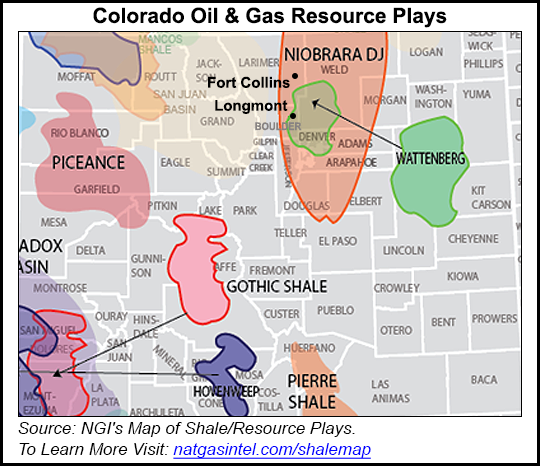Colorado Supreme Court to Hear Two Fracking Ban Cases
The Colorado Supreme Court on Monday decided to take jurisdiction over appeals of hydraulic fracturing (fracking) restrictions enacted by Longmont and Fort Collins, CO, following a request from the state Court of Appeals (see Shale Daily, Aug. 19).

Two years ago, the Colorado Oil and Gas Conservation Commission (COGCC) joined a lawsuit by the Colorado Oil & Gas Association (COGA) against Longmont’s fracking ban (see Shale Daily, July 17, 2013).
At stake are questions about the legality of Longmont’s ban and Fort Collins’ five-year moratorium on fracking, a COGA spokesperson said. “We look forward to once again having the [state] Supreme Court put further clarification that the ban implemented in Longmont and that the Fort Collin’s moratorium are preempted by current law and are thus illegal,” said Doug Flanders, COGA director of policy and external affairs.”
In the meantime, Flanders said COGA will continue to do “the difficult work” of finding reasonable and workable solutions with supporters and neighbors across the state.
Earlier this year, Colorado’s Court of Appeals referred the Longmont/Fort Collins decisions directly to the Supreme Court without ruling, citing the significance of the cases and that they raise a number of important legal issues, which the lower court decided would require determination by the Supreme Court.
Last year, three different district courts in the state struck down similar local enactments, finding that they were implied to be preempted by the state or that an operational conflict prohibited enforcement of the local law (see Shale Daily, Oct. 1, 2014).
Dating back more than two years, three towns within weeks of each other — Boulder, Broomfield and Lafayette, CO — voted to place moratoriums on natural gas and oil exploration and fracking (see Shale Daily, Nov. 6, 2013). The ballot initiatives were seen as largely symbolic efforts, since there was little to no drilling being done in any of the towns.
© 2024 Natural Gas Intelligence. All rights reserved.
ISSN © 2577-9877 | ISSN © 2158-8023 |
